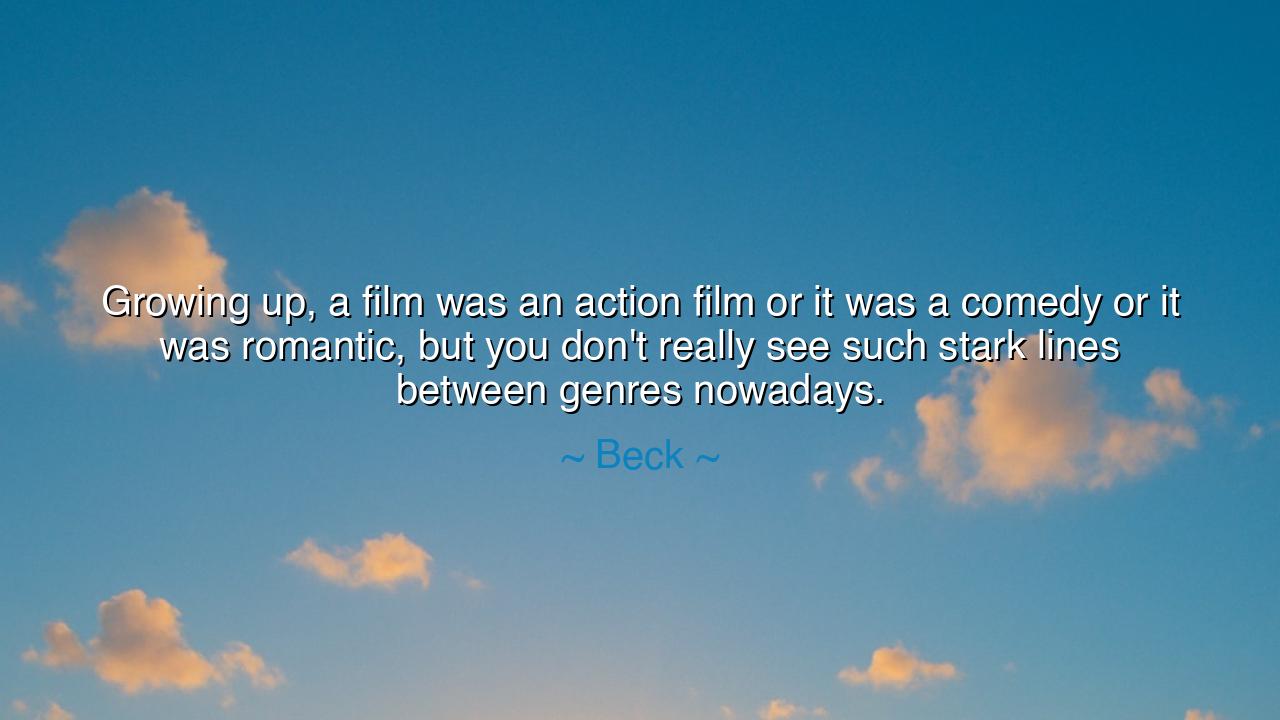
Growing up, a film was an action film or it was a comedy or it
Growing up, a film was an action film or it was a comedy or it was romantic, but you don't really see such stark lines between genres nowadays.






"Growing up, a film was an action film or it was a comedy or it was romantic, but you don't really see such stark lines between genres nowadays." These words by Beck reflect the fluidity of art and culture, particularly in the realm of film, where the clear distinctions between genres that once defined storytelling have become increasingly blurred. In the past, the boundaries between genres were sharply drawn—an action film was all about adventure and excitement, a comedy was meant to make one laugh, and a romantic film was centered on love and relationships. However, as Beck observes, modern films no longer adhere to these rigid structures. Genres have merged, creating hybrids that defy easy categorization, just as our understanding of life itself becomes less and less about neat boxes and more about complexity and interconnection.
In the ancient world, the Greeks were no strangers to genre-blending. Consider the Greek theater, where tragedies and comedies were often performed together, sometimes within the same play. Aristophanes, the great comic playwright, wove satirical humor into his works, poking fun at Athenian society and politics, while Sophocles and Euripides explored the tragic depths of the human soul. Greek theater thus became a reflection of the full range of human emotions, mixing joy and sorrow, hope and despair, humor and pathos. These early plays did not abide by the strict separation of genres we might expect today, instead offering a cathartic blend of all human experience in one performance.
The Roman playwrights also embraced a sense of genre fluidity. Plautus, known for his comedies, often infused his works with elements of romantic intrigue and social commentary. His plays were not just about humor, but about human desires, conflicts, and complex emotions. Similarly, the epic poems of Virgil, such as the Aeneid, while full of heroic action, also weaved in themes of romantic love and duty, blending tragedy and adventure to create a narrative that was both thrilling and poignant. Beck’s insight into the shifting nature of film genres thus draws on a much older tradition, where the lines between comedy and tragedy, action and emotion, were never so neatly defined.
As cinema has evolved, the blurring of genres has only increased. The rise of postmodernism in film has led to a deconstruction of traditional genre conventions. Quentin Tarantino’s work, for instance, is often cited as an example of how films can blend violence, humor, romance, and action into a seamless whole. Pulp Fiction, one of his most famous films, challenges the notion of a single, clean genre by weaving together non-linear storytelling, dark comedy, crime, and moments of intimate drama. This fusion reflects a cultural shift toward embracing complexity, where people are less interested in simplistic labels and more inclined to appreciate the richness of human experience in all its contradictions.
The lesson from Beck's reflection on the changing nature of genres is that life, much like art, cannot be contained by simple categories. Genres, like people, are not static, but evolve as they encounter the full spectrum of human emotion, experience, and expression. Just as modern filmmakers mix genres to reflect a more complex world, we, too, should embrace the fluidity and ambiguity of our own experiences. Life is not a series of isolated moments neatly categorized as happiness, love, or adventure, but a tapestry of interconnected experiences that defy the boundaries we try to impose on them.
In our own lives, we must learn to reject rigid categories—to embrace the idea that our emotions, our experiences, and our aspirations are multifaceted and interconnected. Just as a film today may include elements of comedy and action in one scene, and romance and drama in another, so too should we allow ourselves to live fully in all the dimensions of our being. Our journeys are not defined by single genres, but by the richness of our interactions, decisions, and growth. We should not limit ourselves to the expectations others place upon us, but instead, create and live in a way that reflects the complexity of who we are.
Let us, then, take Beck’s words to heart and embrace the blending of genres in our own lives. Let us live boldly in the intersections of different passions, emotions, and dreams. Whether we are working in relationships, careers, or personal growth, let us remember that the greatest stories are those that are rich, layered, and multidimensional. Life is not a simple narrative; it is an ever-evolving tapestry of experiences that we should honor and explore, without the need to limit ourselves by predefined categories.






AAdministratorAdministrator
Welcome, honored guests. Please leave a comment, we will respond soon